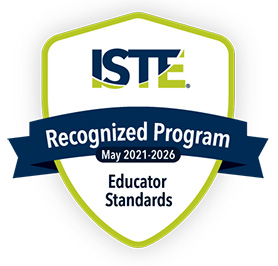|
Instructional Technology Courses
-
ITEC 7305 Data Analysis & School Improvement
In this course, educators will learn to utilize data to identify school improvement needs and make informed decisions in effectuating change. The ultimate goal of this course is to produce educational leaders who effectively collect, analyze and use data to improve schools through successfully demonstrated change models. In this course, educators will learn to systemically collect and analyze multiple sources of data to identify improvement needs, determine an effective response, monitor and correct progress, and demonstrate success to stakeholders. Additionally, students will learn to drive and sustain change in a collegial environment, culminating in students’ understanding of, and ability to use, a wide range of applicable leadership practices. Finally, students will learn a variety of technology tools to use for data analysis. They will also learn a variety of Web 2.0 tools to facilitate school communication. |
-
ITEC 7400: Teaching, Technology & Student Engagement
This course introduces candidates to technologies available in schools and explores
technology integration frameworks grounded in research-based pedagogical strategies
to maximize student engagement. Candidates will design exemplary technology-supported
learning experiences that foster higher-order thinking, collaboration, authentic/meaningful
learning tasks, and achievement of student content and technology standards. Candidates
will also learn how to coach other educators toward higher levels of technology implementation.
Appropriate for classroom teachers and other educational leaders interested in increasing
effective technology-supported instructional practices in their schools. |
-
ITEC 7485: Creating with Emerging Techologies
In this course, we use the design process to create learning experiences that are
relevant, engaging, and support learner agency. We will explore how emerging technologies
can be used to nurture creative expression. Topics in this course may include the
following: active learning spaces, adaptive learning technologies, artificial intelligence
(AI), augmented and virtual reality (AR/VR), coding, computational thinking, game-based
learning, learning analytics, machine learning, open educational resources (OER),
and other emerging trends. In addition, throughout the course, we will engage in digital
tinkering in order to develop an innovative digital project with students. |
-
ITEC 7430: Digital Tools for Learning
This course introduces candidates to methods and strategies for using the Internet
effectively in the classroom. Students will experience a variety of Internet technologies
and develop strategies for classroom implementation. The course includes guided tours
of some of the best educational sites on the World Wide Web and explores ways to integrate
use of the Internet into an educational setting. This course introduces students to
systematic instructional methods and models for using the Internet effectively in
the classroom. Candidates will create lessons that are current, highly motivating,
and mentally engaging. |
-
ITEC 7455 Digital Citizenship in Schools
To foster digital citizenship in P-12 schools and among their students, this course
provides candidates with knowledge of digital citizenship and the skills and procedures
to design and implement technology-enhanced learning that inspires students to positively
contribute and responsibly participate while online and beyond. Through this course,
candidates will explore multiple elements of digital citizenship to design and implement
lessons that build relationships in online contexts and foster both digital literacy
and media fluency, as well as mentor and model for students to facilitate appropriate
online practices and protections. |
-
ITEC 7460: Professional Learning & Instructional Technology Coaching
This course prepares educators to join local and global learning networks for professional
learning and serve as instructional technology coaches, providing quality instructional
coaching to their peers. Learners are prepared to join local and global learning networks,
build partnerships with school leadership, conduct individual need assessments of
teacher technology use, establish coaching relationships, and design high-quality
professional
learning experiences that help other educators apply technology to enhance professional
practice. Candidates learn to apply change models and diffusion theory in order to
implement technology innovations in classrooms. |
-
ITEC 7480 Introduction to Online & Blended Learning
This course explores principles for effective online and blended learning and provides
an
introduction to key terms, issues, policies, challenges, and emerging trends in the
field. Topics include published standards for quality online teaching and course design,
accessibility to online courses, online assessment principles, accommodations for
students with disabilities, strategies for supporting cultural and linguistic diversity,
internet safety, student privacy and copyright. Candidates learn pedagogical strategies
for use in an online learning environment and apply them to their certification field. |
-
ITEC 7500: Capstone Experience & Portfolio
This three-credit hour course represents the culminating experience for the initial-certification programs in Instructional Technology. Through the creation of a portfolio, students document mastery of the Georgia PSC Instructional Technology standards. The portfolio documents the candidate’s ability to provide technology facilitation at the building level as well as their expertise as an Instructional Technology educator. The portfolio serves as a systematic, reflection-in-action approach to problem solving and decision-making, providing a detailed authentic picture of the candidate’s professional practice and reflective analysis of the integration of courses taken supported by theory. Changes in classroom practices and vision will be included. |
-
ITEC 7600 - Personalized Learning & Tech-Rich Environments
This course introduces classroom teachers to personalized learning in technology-rich environments. Candidates will learn various theories and rationale for personalized learning as well as definitions, state standards, and key components of personalized learning. Candidates will devise a plan for implementing personalized learning. The plan will include personalized learning principles and learning standards to address instructional strategies and components of personalized learning and technologies that support personalized learning environments. This course provides the candidate with a broader initial understanding of how personalized learning came about and foundational knowledge of how to create a personalized learning environment enabled by technologies. |
|


















